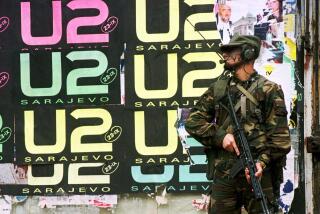As Sarajevo Recalls Massacre, Combatants Agree to Open a Road : Bosnia: Civilian traffic into and out of capital is set to resume. A year ago, a bomb killed 68.
- Share via
SARAJEVO, Bosnia-Herzegovina — The Muslim-led government and rebel Bosnian Serbs agreed Sunday on opening a road into and out of the capital for civilians, who have been cut off from the outside world since July, a government official said.
Meanwhile, citizens thronged the Sarajevo marketplace to observe the first anniversary of a massacre that galvanized international will to intensify peace efforts. On Feb. 5, 1994, 68 people died at the site from the impact of a mortar bomb in the worst such incident of the war.
The attack set in motion peace initiatives that obliged Serbs, under threat of air strikes by the North Atlantic Treaty Organization, to remove most of their tanks and siege guns from around the city and that after many months of mediation culminated in the present cease-fire.
Muslims and Serbs blamed each other for firing the fatal mortar bomb, and U.N. peacekeepers said their investigation was unable to determine which side was responsible.
Hasan Muratovic, Bosnia-Herzegovina’s liaison to the United Nations, said Sunday’s agreement will permit civilians in government-held parts of the city to cross the airport to reach the suburb of Butmir. From there, they can proceed to government-held central Bosnia and then to Croatia.
It also will permit movement by civilians between the suburbs of Lukavica and Ilidza, both controlled by Serbian troops, Muratovic told Bosnian radio.
Because the warring factions will share a stretch of the road, they will use it on alternate days.
The road is set to open this morning, first to residents of government-held Bosnia, Muratovic said.
A U.N. official, speaking on condition of anonymity, warned that the agreement was only verbal. A similar verbal understanding last month fell apart because the two sides had opposing interpretations.
Opening the road was a provision of the truce brokered by former U.S. President Jimmy Carter and signed Dec. 31 by the government and Bosnian Serbs.
The Serbs, whose weapons can target the road, opened it to international aid convoys on Wednesday. But they balked at the Bosnian government’s demand that civilians and commercial traffic be allowed to use it.
U.N. officials reported an uneasy calm across most of Bosnia on Sunday except in the Bihac pocket in the northwest, where fighting between government forces and an alliance of Bosnian and Croatian Serbs and renegade Muslims continues to mar the truce.
Muratovic, the Bosnian official, said talks will continue on opening the airport road for commercial use as well. The route was closed by threat of Serbian gunfire in July, as lack of progress on peace talks led to heightened tensions.
Bosnia’s war broke out in April, 1992, when Serbs rebelled against the republic’s decision to secede from the Serb-dominated former Yugoslav federation. More than 200,000 people have been killed or are listed as missing in the fighting.
More to Read
Sign up for Essential California
The most important California stories and recommendations in your inbox every morning.
You may occasionally receive promotional content from the Los Angeles Times.













